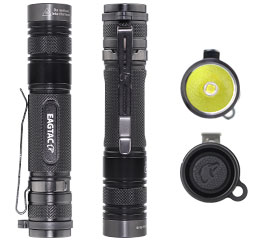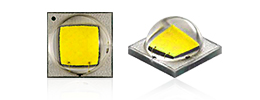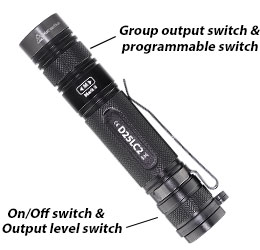Dimensions
- Head Dia.
- 0.9 inches (22.5 mm)
- Body Dia.
- 0.85 inches (22 mm)
- Length:
- 4.5 inches (115 mm)
- Weight
- 1.7 ounces (49 grams)1

Battery Type
- 2xCR123A, or 1x18650 li-ion2
- Battery cell and the protection circuit must sustain 5A+ discharge
- Compatible battery size (diameter/length)
- 123A: (16-16.8mm/34-34.5mm)
- 18650: (18-18.8mm/65-68.5mm)
- Read precaution with li-ion batteries.
- We recommend using EAGTAC 18650 li-ion with protection PCB built-in
Operating voltage
- 2.7V - 6.0V
What's included
- D25LC2 Clicky MKII flashlight
- Stainless steel bezel w/ durable dark titanium coating
- Spare o-rings
- Harden spring steel pocket clip (Titanium coated)
- User Manual
- Rigid Nylon Holster w/ self-retention device and flip
- Mil-Spec paracord lanyard w/ quick attachment clip
- Para-cord lanyard with quick attachment clip
- IPX-8 standard
- Smooth aluminum reflector
- HAIII hard anodization aerospace aluminum
- Waterwhite glass lens w/ harden treatment
- Anti-reflective (AR) coating on both side (96% transparency)
- 3.7V 18650 2600mAh li-ion protected battery (10A discharge)
- 3.7V 18650 3500mAh li-ion protected battery (10A discharge)
- Rigid nylon holster w/ self-retention device
- Lens
Carrying method
Waterproof
Reflector
Material
Lens
Optional accessories
LED
- CREE XM-L2 Cool White U4 LED
- CREE XM-L2 Neutral White U2 LED
- Nichia 219C CRI-92 R9050 D240 LED

Max output
- CREE XM-L2 Cool White U4 LED
- LED lumen: 1480
- ANSI FL-14 lumen: 1150
- CREE XP-L HI Cool White V3 LED
- LED lumen: 1303
- ANSI FL-14 lumen: 1000
- Nichia 219C CRI-92 R9050 D240 LED
- LED lumen: 880
- ANSI FL-14 lumen: 655
Beam Profile
CREE XM-L2 Cool White U4 LED- Center lux: 10,500 lux3
- Center spot angle: 11.4°
- Spill light angle: 62°
- Beam distance: 223 yards / 205 meters
- Center lux: 9400 lux3
- Center spot angle: 11.4°
- Spill light angle: 62°
- Beam distance: 211 yards / 194 meters
- Center lux: 7500 lux3
- Center spot angle: 8.6°
- Spill light angle: 60°
- Beam distance: 189 yards / 173 meters
LED circuit
- W3400 RC
- Current regulated buck converter with external ultra low resistance power mosfet which offers up to 96% efficiency7
- Uses low-ESR MLCC and tantalum capacitor for input and output decouple
- Uses molded power inductor for higher saturation current and less electromagnetic interference
- Current regulated output (non-PWM) for all brightness levels without flicking
- Active thermal management that adjusts output according to flashlight temperature5
- Three customizable brightness level for very low and low output
- User defined startup level for loose head
- Zero standby current
Output and Runtime
- Five output levels
- Led lumen:
- Max: 1480-7605
- High: 760
- Medium: 290
- Low: 75
- Very Low: 18/5/0.5
- ANSI FL-1 lumen:
- Max: 1150-7605
- High: 585
- Medium: 225
- Low: 60
- Very Low: 15/5/0.5
- Programmable Low and Very Low output
- Runtime:
- EAGTAC 18650 3500mAh:6
- Max: 1.1-2.2 hrs
- High: 2.8 hrs
- Medium: 8 hrs
- Low: 33 hrs
- Very Low: 150/1000/1500 hrs
- EAGTAC 18650 2600mAh:
- Max: 0.8-1.6 hrs
- High: 2 hrs
- Medium: 5.8 hrs
- Low: 25 hrs
- Very Low: 110/750/1100 hrs
- EAGTAC 2xCR123A 1700mAh:
- Max: 0.6-1.1 hrs
- High: 1.6 hrs
- Medium: 5 hrs
- Low: 22 hrs
- Very Low: 95/600/900 hrs
- Hidden auxiliary outputs
- Group 1 (tight head): Strobe(Variable)
- Group 2 (loose head): Strobe(Constant)/Flash(Hi)/S.O.S.(Fast)/Beacon/Flash(Low)
Operations
Basic operations:- Basic - Press on the switch button until it clicks to turn on the flashlight. Press the switch again until it clicks to switch off the light.
- Access output groups 1 & 2 - Tight the head to access group 2 output. Loose the head to access group 1 output.
- Group 1: MAX - Strobe (Variable) - cycle
- Group 2: Very low - low - med - high - Very low - low - med - high - Strobe(Constant)- Flash(Hi)- S.O.S.(Fast) - Beacon - Flash(Low) - cycle
- Switch between output level - With the flashlight on, slightly press the switch and release (within 1s) to switch to the next output.


User define function:
- Change brightness level for the lowest output. To toggle the brightness level, turn on flashlight and switch to the lowest level with head loose, wait for at least one second, and repeat head tight and loose three times.
- Define any output level as start-up output level for group 2 (loose head). To toggle this setting, choose any level with head loose, wait for at least one second, then tight the head, wait for at least one second, and then repeat loose and tight for three times.
Controls

Other features
- LED Copper MCPCB star board with DTP technology and direct heat path
- User replaceable glass lens
- Battery reverse polarity protection
- Ultra low internal resistance phosphor bronze springs (silver coated)
- Tail stand
Warranty
- Ten years performance guaranteed warranty
- Read flashlight regular maintenance
Battery Safety Precaution
Ensure the protective circuit on the battery has current limitation of higher than 5A. Always use proven EAGTAC batteries for best performance and reliability.All EAGTAC flashlights are designed to use button-top battery (battery with protruding positive terminal). For rechargeable li-ion battery, use only EAGTAC li-ion battery, or other protected li-ion battery with compatible length and diameter. Before using the battery, check and ensure the battery outer wrapping (the isolating plastic film that wraps around the metal housing of the battery) is complete. Broken battery wrapping may lead to short circuit and damage to the flashlight.
Lithium and Li-ion battery can explode or cause burns if disassembled, shorted, or exposed to high temperature. Do not mix new and used batteries. Do not mix batteries with different brand, capacity, voltage, or install batteries backwards.
NiMH rechargeable battery may release gas during discharge. If you experience an inflated switch boot or find high pressure being built inside the flashlight, switch off the flashlight immediately. Slowly loosen the tail-cap to reduce the internal pressure and replace all batteries. Back to top
Flashlight Maintenance
Periodically clean the threads and o-rings with a lint free cloth and apply a thin coating of EAGTAC synthetic grease to the o-rings and threads. After prolonged exposure to moisture, the head and batteries should be removed, inspected, and dried. If you find any oxidation on the battery contact or on the flashlight contact, use a sharp tool to scrap it off. Do not touch or attempt to clean the reflector, as it will scratch the reflective coating permanently. Back to topAccessories

CR123A Lithium Battery
EAGTAC CR123A high performance lithium battery. 1700mAh capacity. PTC protected.

LED upgrade module
Upgrade to XP-L HI, XM-L2, XP-G2, Color, UV 365nm-370nm, 395nm-400nm, IR 850nm.

18650 Li-ion Battery
EAGTAC 18650 high performance li-ion rechargeable battery. 3100mAh / 3400mAh / 3500mAh capacity. IC protected. Japanese made cells.

Diffuser/color filters
Add-on diffuser filter to transform into a flood beam. Choose from red, yellow, green, blue color filter.
- Not includes battery
- Battery with protruded top must used in this flashlight.
- Beam output diameter taken at one meter
- ANSI FL-1 Lumens is a measurement of light output standardized by American National Standards Institute for use with flashlights. This ANSI Lumen measurement is the total overall light output being emitted from the flashlight. This measurement is generally more accurate as it takes into consideration the loss from reflector/lens/bezel. EAGTAC’s ANSI Lumen output is measured with flashlight cold start-up using a calibrated integrated sphere.
- At maximum output level (100%), the active thermal management feature slowly reduce the maximum output level according to the flashlight internal tempearture to 50% once flashlight reaches 140°F (60 °C) (higher surrounding temperaturemay result in higher flashlight temperature). It's normal for high power flashlight to run hot at MAX level. Reduce the output if the user finds the flashlight too warm to hold.
- Uses EAGTAC protected 18650 3500mAh li-ion rechargeable battery
- Maximum efficiency occurs when input voltage is very close to LED forward voltage.
- Details and feature maybe subject to change without notice.